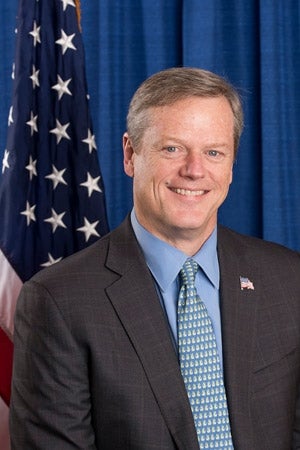In the wake of reports of long-time state employees walking into retirement with lucrative compensation packages boosted by payouts for unused sick time, Gov. Charlie Baker on Wednesday unveiled legislation to cap sick leave accrual at no more than 1,000 hours, or six months of work.
The governor believes the state can save up to $3.5 million in cash payouts annually with the reform, but a legislative sponsor of similar legislation predicted just last week that the idea would face a tough road toward becoming law this session with strong union opposition.
“Sick leave is a benefit designed to offer employees a way to deal with health and family issues, not a retirement bonus,” Baker said in a statement. “Bringing the Commonwealth’s sick leave accrual policy in line with other private and public sector employers just makes sense and is the fiscally responsible thing to do.”
The new policy, if enacted, would grandfather the approximately 5,800 executive branch employees who have already accrued more than 1,000 hours, and those workers would be capped at the amount of leave they have collected at the time the new law took effect.
Employees now can accrue up to 15 sick days each year and cash out at retirement for 20 percent of their unused time. According to the administration, 378 employees in fiscal year 2015 had more than 1,000 hours of sick leave built up and their retirement payouts amounted to nearly 80 percent of the total cost to the state for sick leave retirement payouts.
Last week, Dracut Rep. Colleen Garry testified before the Joint Committee on Public Service about her own bill (H 4289) that would limit sick leave payouts to 15 percent of an employee’s annual salary. She said she filed the legislation after learning about the $400,000 in sick leave payouts made to the retiring president and executive vice president of Middlesex Community College.
Many of the examples used by critics of state retirement benefits come from the higher education sector. Reports of a nearly $270,000 payout to former Bridgewater State University President Dana Mohler-Faria helped prompt the Department of Higher Education to launch of review of leave policies across the higher education system in March.
“I am so pleased that the Governor has recognized the taxpayers’ frustration at the types of ‘golden parachutes’ we have seen recently by high ranking public employees leaving state service. I think his legislation will be an effective tool to mandate sick leave and vacation time be used correctly in the future,’ Garry said in a statement released through the governor’s office Wednesday.
Garry, in her testimony, said she knew her proposal was likely to change through the process, but said she believed the state should find a way to pay public employees fairly during their working years and not push compensation into retirement packages.
Unions representing police, firefighters and teachers have expressed their opposition to Garry’s bill, prompting the conservative Democrat to tell the News Service her bill has a “hard road to go” before becoming law.
Massachusetts Teachers Association President Barbara Madeloni said the measure would “sweep away” collective bargaining rights.
“This bill would also unjustly undermine the diligent work being done by those public servants who put off vacation time and sick leave in the interest of getting the job done, those who sacrifice time with family and friends with the knowledge they will be compensated for the sacrifice in the future,” Madeloni said.

